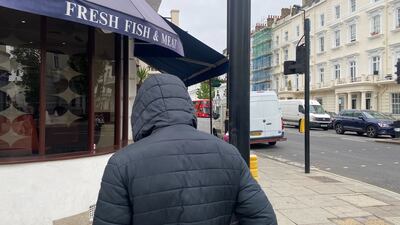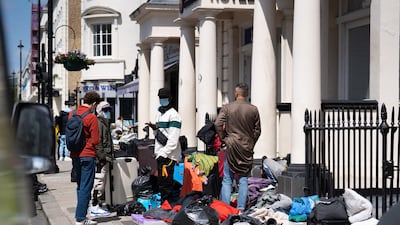Sitting on a wall outside the hotel where he now lives, Alex Karre’s frustration soon boils over when talking about his life in London.
The 23-year-old former fisherman from Congo was one of a group of migrants who staged a protest after, he claims, they were “lied to” about why they were sent there, as well as the cramped conditions in which they say they now find themselves.
All he wants to do is go out to work while his claim is processed but is instead bored, penniless and stuck in a small room shared by four men.
“I have no money but if they give me papers today, then tomorrow, I’m going to work, 100 per cent,” he told The National.
The migrants stuck in the Comfort Inn hotel in Pimlico, central London, are the reality of Britain’s broken asylum system.
The latest figures reveal that the UK has a backlog of 137,583 asylum claims compared with 97,630 in May last year. Prime Minister Rishi Sunak has sought to save £250 million ($311 million) from the accommodation outlay by introducing shared rooms. People like Mr Karre are the first to be caught up in the policy. "You should be willing to a share a taxpayer-funded hotel room in central London," Mr Sunak said.
Mr Karre has been waiting about a year and a half while his asylum claim is processed, while others at the hotel have been waiting two years.
During their protest, about 25 asylum seekers sat on the pavement with their belongings outside the Comfort Inn, a stone’s throw from some of London’s most exclusive addresses.
Another migrant who The National spoke to, a 24-year-old from Iraqi Kurdistan, also took part in the protest.
Like Mr Karre he arrived on a migrant boat after crossing the English Channel but now finds himself trapped in the system.
“For us it’s like a prison. This is a really nice area if you have money but we can’t do anything.”
Mr Karre alleges that the migrants eventually ended their protest after being told “if you don’t go in” then their support would be withdrawn and “we will be homeless”.
“We live in a small bed in small room with four people in one room. There’s nowhere to leave your stuff and the bed is one up, one down,” he said.
“The room is enough for two people maybe but not four. The room smells and the bathroom is inside the room. We don’t want trouble but we don’t want to live here.”

They now get by on about £8 a week, the price of a single Won Ton noodle dish at the nearby two-Michelin-star restaurant A Wong.
“You can imagine, one year and seven months, not allowed to work, nothing,” Mr Karre said.
“I’m 23 and I want to buy something but I have no money. What am I going to do? I’m not going to rob someone.”
Mr Karre makes the case for being allowed to work while his asylum claim is being processed, saying he often hears about the cost of the asylum system to taxpayers.
“If they’re spending a lot of money the best way is to give us papers and I go to work, pay my bills and pay my tax,” he said.
“If I pay tax, you’re not going to spend any money on me. But they don’t want to give us that. It’s just about the politics.”
The Iraqi Kurd, who was a chef at home, would also like to work but instead often finds himself wandering the streets just for something to do.
They were previously housed in a hotel in Ilford but were moved to their present accommodation, the circumstances of which are what appear to have provoked the protest.
“We were living there for one year and seven months and it was good," Mr Karre said.
“They said ‘you guys are going to the best hotel’ and because it was central London we were happy to come. They didn’t tell us what it would be like.
“They lied to us. We were so angry. So we went outside.”
He is reluctant to discuss exactly how he travelled from his homeland but said he left "because you know the politics in Africa" and had heard that "Britain is a good country".
"When I was in Africa I was working, fishing on the sea. Here I'll do anything."









